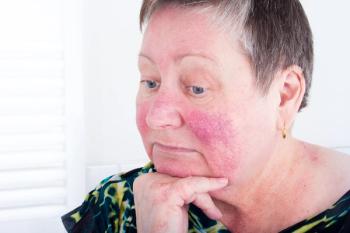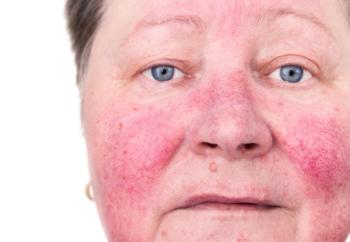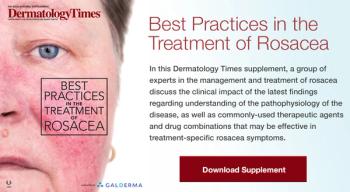
Rhinophyma is a disfiguring condition with deleterious psychosocial and functional consequences, and its pathogenesis remains unclear. Deborah S. Sarno ff, M.D., offers insight on its etiology, and treatment options in this article.

Rhinophyma is a disfiguring condition with deleterious psychosocial and functional consequences, and its pathogenesis remains unclear. Deborah S. Sarno ff, M.D., offers insight on its etiology, and treatment options in this article.

Topical ivermectin cream, 1% (Soolantra, Galderma) represents an advance in treatment for rosacea, o ffering superior e fficacy and tolerability compared with previously available therapies, says Je ffrey S. Fromowitz, M.D., who spoke at the Orlando Dermatology Aesthetic & Clinical Conference.

Positive phase 3 results from two clinical trials suggests that Sol-Gel’s novel 5% microencapsulated benzoyl peroxide cream may offer quick, effective relief for patients with papulopustular rosacea.

A combination of ivermectin 1% cream and oral 40-mg doxycycline has the potential to be an effective therapy for some people with moderate to severe rosacea after the publication of results from a phase 3b/4 study examining the combination’s efficacy and safety compared to ivermectin as a monotherapy.

Susan C. Taylor, M.D., shares distinguishing characteristics of differential diagnoses to keep in mind when examining skin of color patients for rosacea.

It's thought that rosacea affects about 10% of the population, but this estimation may not be completely accurate as the condition is often underdiagnosed – especially in individuals with darker skin types.

Sol-Gel announces updates to their drug pipeline and their goals for 2020, which include submitting multiple provisional patents and NDAs for the treatment of a variety of skin conditions.

Hovione recently published results of a phase 2b study showed a topical gel formulation of 1% and 3% minocycline proved to be an effective and safe treatment for papulopustular rosacea.

Drs. López and Kaufman discuss two new studies that examine the use of ultrasound technology as a new modality for treatment of erythematotelangiectatic and refractory rosacea.

There is still room for improvement to the National Rosacea Society Expert Committee's updated classi fication schema for rosacea, according to William James, M.D.

A web-based survey indicates erythema severity correlates with rosacea’s quality-of-life impact.

Abnormal proliferation of the Demodex mites is frequent among patients with erythematotelangiectatic rosacea (ETR), according to one expert.

A recent preclinical trial reveals that oxymetazoline in combination with pulsed dye laser may increase vascular shutdown in patients with rosacea and other cutaneous vascular diseases.

Evidence that points to interleukin-17 playing a role in the development and progression of rosacea also indicates research should investigate IL-17 inhibition as a therapeutic option for some patients, an expert says.

Stay up to date on the latest recommendations for rosacea diagnosis, classification and management from the global ROSacea COnsensus (ROSCO) 2019 panel.

Rosacea is often underdetected and misdiagnosed in skin of color patients. This expert wants to increase dermatologists’ awareness of how rosacea might present differently in skin of color and how best to treat it without causing post-inflammatory hyperpigmentation.

Patients with rosacea appear to have a significant increase in the risk of breast cancer when compared to those without this skin condition, according to a new study.

New options may be possible for treatment-resistant and severe rosacea with the use of IL-17 inhibitors as researchers conduct studies on effectiveness.

Novel treatments for rosacea such as intradermal botulinum toxin-A and light therapies show promise, but more data is needed to prove their efficacy and safety in this patient population, says a recent paper.

Study suggests rosacea may be outcome of systemic inflammation with evidence linking the condition to cardiovascular disease, inflammatory bowel disease, and even some neurological diseases.

Burt's Bees skin care products may be a effective as an adjunct to prescription therapy in the management of rosacea, according to data published in the February issue of Journal of Drugs in Dermatology which was reported at the American Academy of Dermatology Annual Meeting this month.

Key developments among new and emerging treatments for acne and rosacea include a novel oral agent and a novel topical agent, as well as new formulations of existing products, says Diane S. Berson, M.D. in her presentation at AAD.

Rosacea is a common skin condition that often manifests as redness and flushing, as well as pimples and pustules on the face. Some patients may have evidence of dilated blood vessels near the surface of the skin (telangiectasia) or thickening of the skin, especially around the nose (rhinophyma).

Oracea® 40-mg Capsules are the only FDA-approved oral formulation to treat the inflammatory lesions of rosacea. Oracea® 40-mg Capsules are precisely formulated with a uniquely designed release system, providing an immediate and delayed, non-antibiotic dose for anti-inflammatory control throughout the day.

Three studies point to links between rosacea and numerous systemic comorbid diseases.